At the Berlin Foreign Policy Forum this week, the importance of greater independence for Germany from the People’s Republic of China was once again a matter of intense debate. By contrast, Hong Kong’s head of government declared the opposite to be the ideal solution: John Lee wants to incorporate his city even more deeply into Mainland China. The economy and administration should continue to converge, he emphasized in his first keynote speech in the office of Chief Executive. He wants to systematically pursue the dissolution of his city’s special position.
Only when it comes to Covid has Hong Kong now taken a largely liberal path. After two years of strict regulations, there is hardly anything left of the panic about the spread of the disease – in stark contrast to the situation on the other side of the border.
Hong Kong apparently realized that it suffers more than any other metropolis from the loss of skilled workers and urgently needs to get its act together to avoid being left behind for good. Within two years, 140,000 people have left the city forever.
Such an exodus is not as easy for people in the People’s Republic. But an alternative is crystallizing more and more – moving to the countryside. Fabian Peltsch tells us the story of several dropouts, a story that already reduces a bit of stress just by reading it.

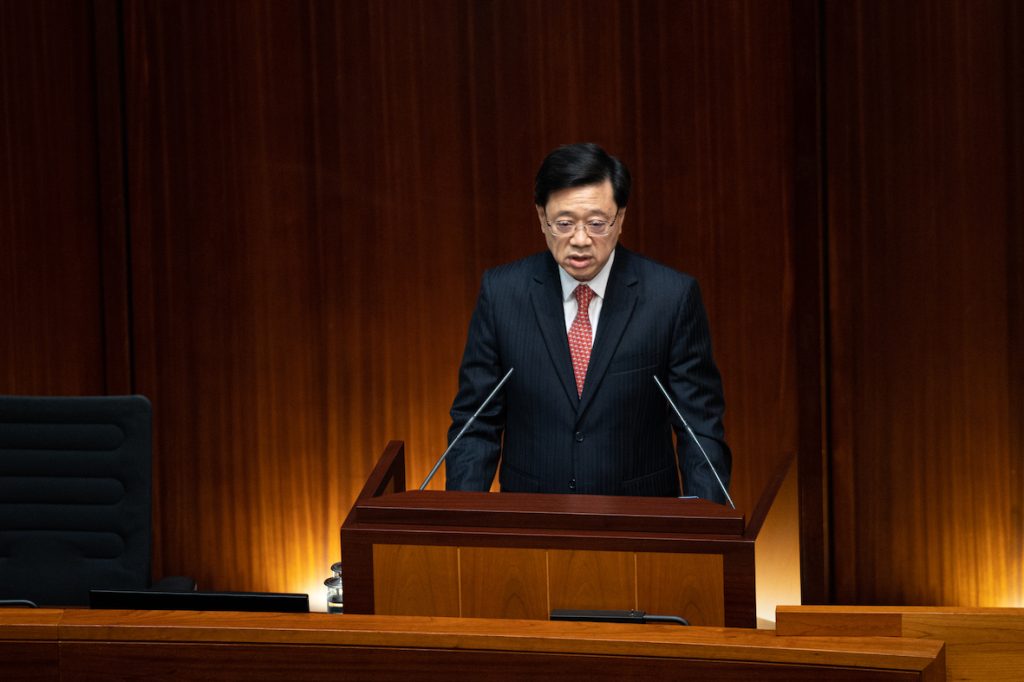
The long shadow of Beijing’s central government loomed over John Lee’s first keynote speech. Right at the beginning, Hong Kong’s Chief Executive once again thanked China’s President and Party Leader Xi Jinping for his words of encouragement when he took office. This would have been an understandable gesture if Lee had only taken office the day before. However, it has already been more than three and a half months since the former police chief took over the city’s administration.
The fact that Lee nevertheless immediately addressed warm words to the Party chief in Beijing before turning his attention to the city’s urgent problems may be interpreted as a ritualized fulfillment of duty as part of Hong Kong’s new political conformity. Despite months of fierce protests by millions of people, the city ultimately lost the autonomy it was promised until 2047, not to mention its democratic development, as it was contractually promised 25 years ago.
That Lee formulated the cornerstones of his policy in parallel with the Party Congress in Beijing, symbolizes Hong Kong’s forced close ideological ties to the People’s Republic. And as if Lee had already fully assimilated into the CP cadres, he delivered the longest keynote speech by a Hong Kong head of government since the city’s handover to China. He demanded the attention of his audience for a full two hours and 45 minutes.
His speech was about as long as the list of challenges that Hong Kong faces. Above all, there is political stability. Lee expressed hope for a “capable government that can deliver results” to lead Hong Kong into the future. Pivotal to that approach: A strong sense of “national sovereignty and security” among administrative officials at all levels. Employees who are “meritorious and exemplary” should be appropriately rewarded in the future.
The growing importance of national security, as also formulated in Hong Kong’s Security Law in 2020, has put active political opposition behind bars or chased it out of the country in recent years and deprived free media of their working basis. Security, as Lee defines it, is thus most likely guaranteed if the city’s people can at least develop existential prospects after they lost their traditional rule of law based on the British model, their liberal civil rights such as freedom of speech, freedom of assembly or freedom of the press.
This is why the city must satisfy such needs first and foremost. “The objective is to let people see hope of getting on the housing ladder earlier and having decent homes,” Lee said. Under a new Light Public Housing (LPH) policy, he wants 30,000 new units built, cheaper to buy than before and at least 26 square meters in size. All of this is to be done quickly, cutting people’s wait time for a suitable unit by two years to just four and a half years on average.
With the development of new residential space in the so-called Northern Metropolis in the New Territories, including the planned technology park on the border with the People’s Republic, Lee wants to further intensify cooperation with Chinese companies. Hong Kong and neighboring Shenzhen are to be progressively integrated. The geographical merger of the cities is part of China’s expansion plans for the entire region, including Guangzhou, Zhuhai or Macao.
In the midst of all this, the Covid pandemic seems like nothing more than a minor nuisance. The city’s harsh Covid regulations also did their part to scare off many foreign companies in the past two years. Now, immigrants do not require a PCR test, nor do they have to go into quarantine. Lee did not want to dedicate more time to the matter than absolutely necessary. “The government will continue to move forward with adjustment and enhancement to anti-epidemic measures in light of the actual situation and development,” he said.
Unlike the People’s Republic, Hong Kong opened its borders to the outside world almost unconditionally almost a month ago. New arrivals are only barred from visiting certain facilities for three days. Otherwise, they are allowed to move freely around the city – partly because hardly any other financial metropolis suffered as much from the departure of international workers during the pandemic as Hong Kong. 140,000 people left the city in the past two years. Among them, however, are tens of thousands of Hong Kong citizens who fled the growing authoritarian development in the city, rather than Covid.
As a result, the local industry faces a growing shortage of skilled workers and experts. Lee promised the city would go international in its search to “snatch up talent” from around the globe. Beijing understood that Hong Kong needs relaxation more than any Chinese city – in part because of the “brain drain”.
The approach here: Lee wants to make Hong Kong more attractive, already starting with university graduates, by issuing visas for two years and reducing the bureaucracy involved in their renewal. Foreign property owners are to be granted tax refunds in an effort to convince them to keep their property and potentially remain in the city. And hiring foreign workers is to become generally easier for local companies.
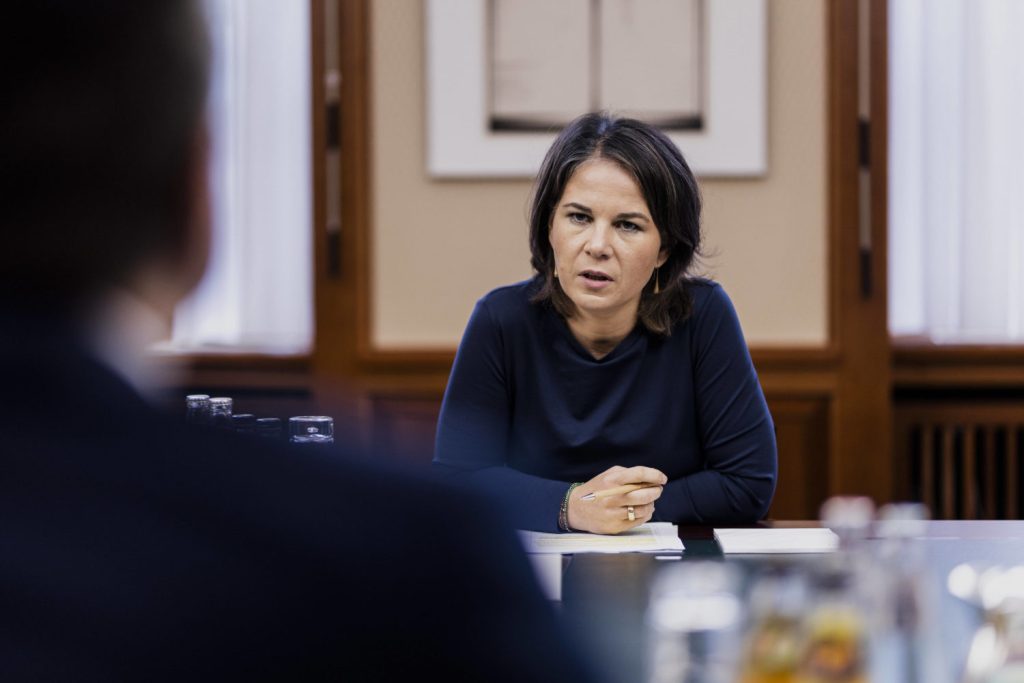
Under fire from Russia, threatened by China – Europe’s promise of security and freedom is at stake, warned Foreign Minister Baerbock at the Berlin Foreign Policy Forum on Tuesday. Her order of the day was resilience against authoritarian regimes. This also applies to Germany, which must not repeat the mistakes of its Russia policy with China, Baerbock said. “One-sided economic dependence exposes us to political blackmail.”
Baerbock wants a change in Germany’s China policy. But in the end, it is Chancellor Olaf Scholz who will sit at the table with Xi Jinping. And he will do so in just two weeks. The Chancellor will be the first G7 head of government to make his way to Beijing since the beginning of the Covid pandemic. He is not alone: As with the numerous trips of his predecessor Angela Merkel, Scholz will be accompanied by a large business delegation, of which at least some members may be hoping for the big deal in China.
Would this mean sticking to the cozy course of the Merkel era, which prioritized the prospect of economic benefits above all else? Scholz would take a big risk. Because Angela Merkel’s Panda China no longer exists, says Kevin Rudd, former Australian prime minister and sinologist, who was also present. Xi Jinping would emerge stronger from this week’s CP Congress in Beijing, believes Rudd. Xi’s “Marxist-nationalist course” will make China’s foreign policy more aggressive – partly because the economy is no longer the top priority. In these uncertain waters, Scholz seeks continuity, Baerbock does not. This is another reason why Germany still does not have a China strategy at the ready, even months after its announcement.
But what do foreign countries expect of Germany? The Baltic States welcome the German foreign minister’s call for more independence from China, partly because Beijing already punished Lithuania with trade embargoes for its stance on Taiwan months ago. Latvia, Estonia and Lithuania left the former 17+1 format of eastern and southeastern European states – frustrated with Beijing’s paternalistic behavior and broken investment promises.
If Baerbock’s announcement of greater independence is not followed by action, German foreign policy will face a further loss of trust in Europe after the ongoing debates about arms deliveries to Ukraine.
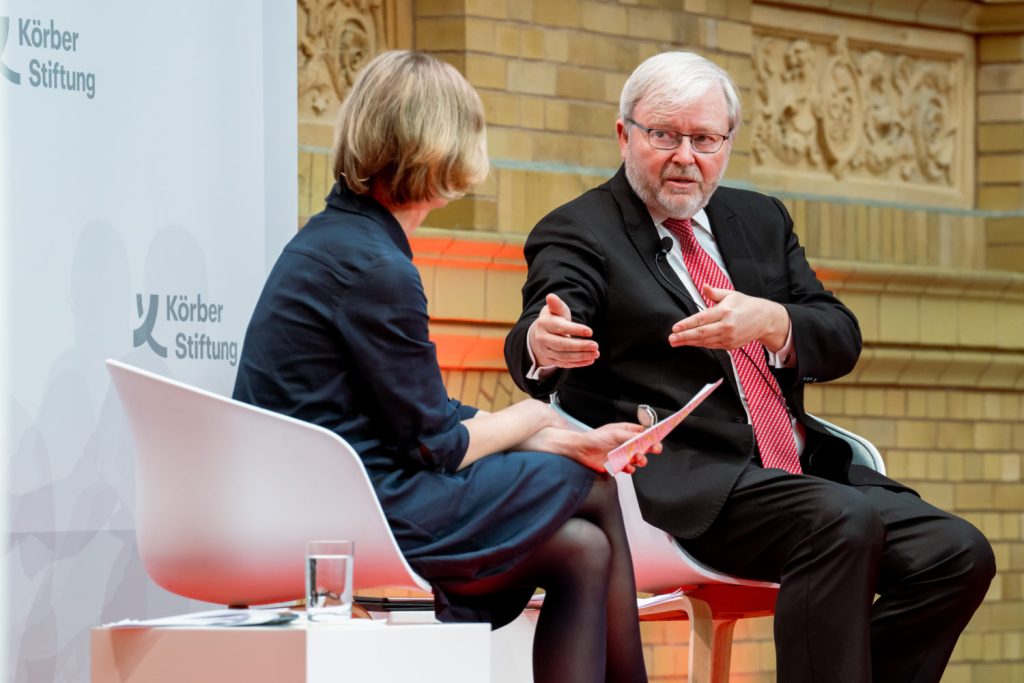
Trust is also a concern for the United States, especially with regard to the Indo-Pacific. China’s military marches up on Taiwan’s doorstep. For years, the US has been increasing its presence, and Germany, too, starts to crawl out of the woodwork. Following the deployment of the frigate Bayern last year, the German navy plans to send warships to the region every two years. But Washington would like to see more.
Is Germany unable or unwilling to do more? State Secretary Franziska Brantner hopes that Germany’s support for Ukraine will also send a signal to the Indo-Pacific: “You can’t just attack another country and get away with it,” Brantner said at the Forum. So will Germany increase its presence in the region? Probably not. “In the area of security, we are still very dependent on the US,” Brantner says.
That is why the German government’s China strategy is eagerly anticipated. Baerbock’s ministry has to perform a balancing act. It must live up to the expectations of the partner countries and cater to domestic sentiment at the same time.
The Berlin Pulse shows: More than 60 percent of Germans are willing to accept cutbacks so that Germany can reduce its economic dependence on China. Only just under 20 percent of Germans want closer relations with China. The general perception of China among Germans has also deteriorated rapidly. Nevertheless, many Germans favor a restrained foreign policy: Only just under half of the German population can imagine increased involvement in fighting international crises.
In the event of a Chinese invasion of Taiwan, Germany’s economy would suffer due to its close ties with the Chinese market. The result would be a political balancing act, just like after Putin’s invasion of Ukraine. It remains to be seen whether Chancellor Scholz will actually take his proclaimed “turning point” with him to Beijing. His colleagues from Eastern Europe will remind him of this often enough. Jonathan Kaspar Lehrer

“This is heaven on earth,” says Zhang Jinglei about her new home. The filmmaker spent ten years in China’s capital Beijing. Ten months ago, she packed her bags and moved to Caicun, a suburb of the city of Dali in the province of Yunnan, about 2,000 kilometers away. In just a few days, the 32-year-old found a two-room apartment for 1,000 yuan in the Bai-minority village. In Beijing, she paid well over three times that amount – for a room in a shared apartment.
The wish to leave Beijing had matured in her for quite some time. Escaping the social pressure in the city was only possible with amusements and alcohol. “I had to take the plunge,” she says. Her life is easier now, says Zhang, who was born in Tianjin, a city of 14 million people. She adopted a dog and even a pig, which she now walks on a leash.

Although the Chinese government promoted urbanization for decades, a reverse migration trend also began to develop. Real estate prices in urban areas have become very expensive, especially for young people entering the job market, and fierce competition for school spots in popular neighborhoods has become nerve-wracking. Added to this is a new awareness of physical and mental health among the middle class. During the Covid pandemic, many Chinese also discovered the diversity of their homeland. According to the Chinese travel portal Trip.com, never before have so many road trips been booked in China as in the past two years. Outdoor sports and camping have also never been more popular in the People’s Republic.
Other city dwellers who turned their backs on the urban insanity during the pandemic live in her house in Caicun, Zhang tells us, including, for example, a former Huawei employee. Many young people who moved to the countryside would at first “lie flat” (躺平 – “tangping”) a buzzword used to describe the social protest of young Chinese who, instead of pursuing of career, family and possessions, only do the bare minimum to make ends meet (China.Table reported). But after a period of acclimatization, many of them want to do something. “Baking bread, opening a bar, or selling art on the street.”
The government welcomes the new urban exodus. President Xi Jinping first spoke of his “rural revitalization” strategy in 2017. This involves the continued replacement of small farmers with large agribusinesses, but there are also newer initiatives to promote medium-sized, organic farms. Another goal is to expand infrastructure with schools, clinics, housing, roads and rail networks. The aim is to make life in the countryside so attractive that urbanites will also move their lives there.
“There are many attempts to revitalize rural areas with young talent,” says Elena Meyer-Clement, professor of Chinese studies at the University of Copenhagen. One of her main research areas is urbanization, and administrative and land reforms in China’s rural and semi-urban regions. Individual local governments specifically promote entrepreneurship and tourism, she says. “It’s a trend that can be seen in almost all other post-industrial states, whether it’s Japan or Brandenburg in Germany.”
What is special, however, is that this process takes place in China at the same time as rapid urbanization – “almost like a kind of exchange of the population controlled from above,” she says. To put it bluntly, small farmers are to migrate to the cities to boost domestic consumption, while young, educated townsfolk are to bring fresh, creative ideas to the countryside to help make the local economy more socially and ecologically sustainable.
That includes so-called “beautiful villages,” Meyer-Clement says. “This involves renovating existing villages or creating completely new ones that look like spruced-up traditional villages.” One example is the village of Longtan with its little creek and mill wheel, which nestles picturesquely in the mountainous landscape of the province of Guangxi. According to the local government, it is supposed to be 400 years old, and it encourages the influx with a budget for art projects and renovation work.
The feng shui seems to be right: Every year, 200,000 tourists visit Longtan to admire the Qing architecture or to watch plein air painters at work. Even the older villagers here have been trained as artists who now sell their work to tourists. “Many of these creative rural residents have Douyin channels, the Chinese TikTok, where they demonstrate how simple but modern rural life can be,” Meyer-Clement says. “Young, dynamic, creative mixed with time-honored values that have been lost in the city.”
However, the trend was only sporadic and limited to more developed areas, especially on China’s east coast. “Absolute poverty has just been overcome. Artist villages are not yet a big deal there,” Meyer-Clement says. “Things like e-commerce already work very well in the countryside. However, I would doubt whether these beautiful villages are a sustainable strategy.”
The new country dwellers, however, certainly see it differently. Shen Lan is one of them. Shortly before Shanghai went into its first major lockdown, the author and cultural scientist moved with her husband to an artists’ village outside Liangzhu in the province of Zhejiang. The landscape, shaped by mountains and rivers, is closely interwoven with Chinese cultural history. People already settled here several thousand years ago.
In the picturesque scenery, Shen is working on a book about Chinese natural philosophy, hermitage, and art. In the morning, she often likes to walk up a hill, ten minutes from her house, to watch the sunrise. Other dropouts like her, a writer, a professional dancer and a professor of anthropology, live in her village. The atmosphere is very warm, she says.

For seven years, Shen had lived in Shanghai, in a spacious apartment near the Jing’an Temple, with a small garden in the backyard. Still, she never found what she was looking for in the city: balance and spirituality. Just like the philosopher Zhuangzi, Shen believes life in the countryside is closely interwoven with the philosophy of tiān rén hé yi (天人合一): The human being is a part of nature. Heaven and man were originally one. The goal is harmony of all elements. “We Chinese have a very deep connection to nature, it’s in our blood,” Shen says. Even the ancient Confucians dreamed of retiring to the countryside once they had fulfilled their duty in the world.
Her long-term goal is to live in an even more eco-friendly and sustainable way, and perhaps one day start an eco-settlement herself. “It’s like going back to our roots. With a higher awareness of nature, of life and of who we really are.” Collaboration: Renxiu Zhao
According to reports, the Australian military is investigating allegations that former pilots have accepted training assignments in China. “I would be deeply shocked and disturbed to hear that there were personnel who were being lured by a paycheck from a foreign state above serving their own country,” Australian Defense Minister Richard Marles said.
Marles’ statement was in response to a BBC report published the day before. The report claimed that up to 30 former British Royal Air Force pilots had been recruited by China’s military as instructors (China.Table reported). The former pilots were offered up to the equivalent of €275,000 to share their knowledge with the Chinese air force.
A spokesperson for the New Zealand Defence Force told Reuters that there have been four known cases of former military members taking up new employment through a South African flight school. Former employees are free to accept new employment after leaving the service. However, this could have implications for continued employment with the armed forces. The South African company in question has not yet responded to inquiries about whether it has hired pilots from the United Kingdom, Australia and New Zealand and sent them to China. mw/rtr
Taiwanese chip contract manufacturer TSMC considers expanding its production capacity in Japan. One goal is to reduce geopolitical risk, reported the Wall Street Journal with reference to internal sources. However, TSMC sources said that no decision has been made yet. The Taiwanese company, which manufactures chips for a variety of large electronics products, is currently building its first chip plant in Japan, located on the southern island of Kyushu.
The semiconductor industry entered a period of upheaval last year, when widespread shortages of chips crippled the auto industry and other sectors. At the same time, the United States and allies like Japan are concerned about the rise of China’s semiconductor industry.
TSMC’s factory currently under construction in Japan is part of the response to these problems. The plant is expected to produce less advanced chips, commonly used in cars and components such as sensors in late 2024. In July, TSMC President Mark Liu stated at the company’s annual general meeting that there were no “concrete plans” to build a plant in Europe (China.Table reported). mw
German anthropologist Adrian Zenz received the first-ever “Snow Lion” human rights award from the International Campaign for Tibet (ICT). Zenz received the award, which comes with 3,000 euros in prize money, at a ceremony last Saturday at the Umweltforum Berlin. The 47-year-old was honored for his groundbreaking research into the internment of millions of Uyghurs and members of other ethnic minorities in the northwestern Chinese autonomous region of Xinjiang.
In 2018, Zenz first made details of his work public that proved systematic re-education with blatant human rights violations by the Chinese government in Xinjiang. Most recently, Zenz published the so-called Xinjiang Police Files, which consist of large records of local police data. The images provided the first insights into the daily life of prisoners in the camps and helped identify several thousand detainees by name.
In his laudatory speech, conservative Michael Brand (CDU), a member of the Bundestag, praised Zenz’s determination, “even though he knows very well that he is opposing the largest dictatorship on our planet, which has gained a great deal of influence and control globally with violence on the inside and a lot of money and many threats on the outside.” grz
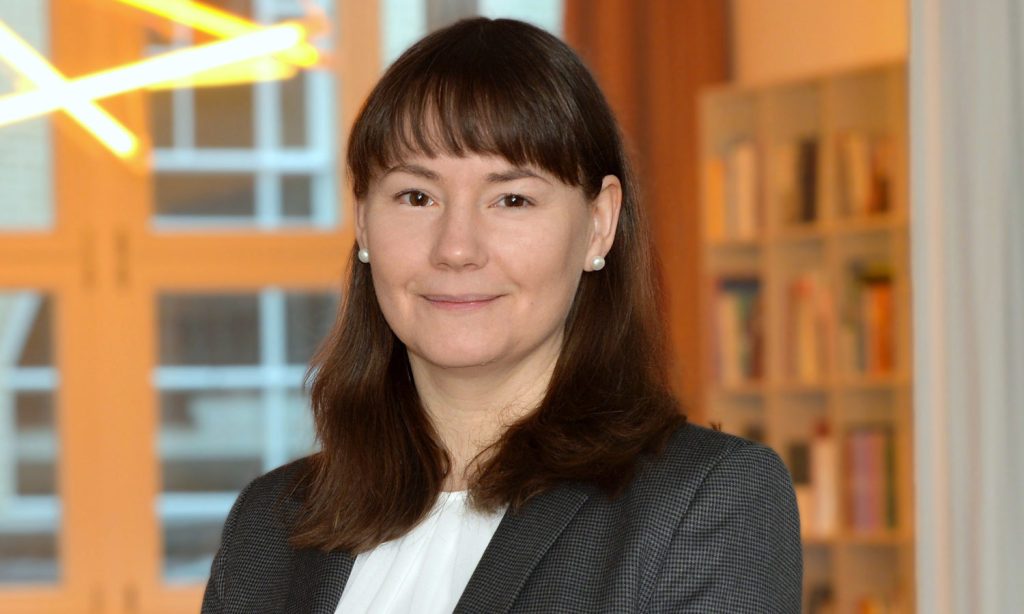
In 2018, Katja Drinhausen decided to leave China for good. At the time, she already lived in the country for twelve years, but then everything fell apart. “The room for debate has narrowed more and more since Xi Jinping took office,” says the current Program Manager at the Merics research institute. By contrast, in the late 2000s, discussions on the Chinese Internet virtually exploded.
Among the best-known bloggers at the time were artists, academics and activists. But it was not only their spectrum that the government constantly restricted. The exchange and cooperation with China’s academia or civil society on social, political or legal issues also grew ever narrower. This development was reason enough for Drinhausen to return to Germany.
In a way, Katja Drinhausen was born into a life with or in China. Her mother was a sinologist at the University of Leipzig, and she spent parts of her early childhood in Taiwan. In this respect, it is not surprising that Drinhausen earned a reputation as a renowned China expert in Germany. She is often consulted when it comes to the Chinese legal system, the human rights situation or the communication strategies of the Communist Party.
But her path was by no means as straightforward as the cornerstones of her biography would suggest. “I actually wanted to do something completely different from what my mother did,” she says now. Although she also initially studied sinology, “I always found it much more exciting to look at current social and political developments in China.” A need she met in the early 2000s with regular trips to the country. One year before the Olympic Games, she finally made her way to Beijing.
She dropped out of her sinology studies and jumped into the event and gastronomy scene in the capital, far away from academic society. To keep her finger on the pulse of China’s political world, however, this line of work proved less ideal. So Drinhausen quickly moved on, taking a job at the Hanns Seidel Foundation, where she initially devoted herself to media and political monitoring. “The interest in the topics that accompany me to this day stems primarily from that time,” she says. At the time, many influential bloggers were lawyers and advocates, some of whom were very outspoken in their criticism of the government. That was one reason to study international and Chinese law in Beijing – with a focus on human rights.
Today, like many of her colleagues, she stands on the other side of the Great Firewall, which China has long used to not only control the Internet, but also its society. This has changed Katja Drinhausen’s work. Not only for the worse, as she finds. She now works a lot with Open Source Intelligence, searching publicly available sources and databases to draw an overall picture.
She notes that, although the red lines have increased in number and moved closer to people’s everyday lives, some topics continue to be controversial and quite openly discussed, such as the harsh lockdowns of recent months or violence against women in Chinese society. “You can see how hard it is for even a full-blown surveillance state to keep all debates in check,” she says.
With the project China Spektrum, she strives to reflect precisely this diversity of debate for the European public as well. It also seeks to draw attention to the situation of ordinary citizens in the People’s Republic. After all, China is more than just a state. Nils Wischmeyer
Anton Vong has been Project Lead for Change and Cooperation Management Joint Ventures BMW China at BMW in Munich since August.
Tian Huiyu, a former bank director, was expelled from the Chinese Communist Party. In April, he was arrested for corruption as head of China Merchants Bank.
Is something changing in your organization? Why not let us know at heads@table.media!
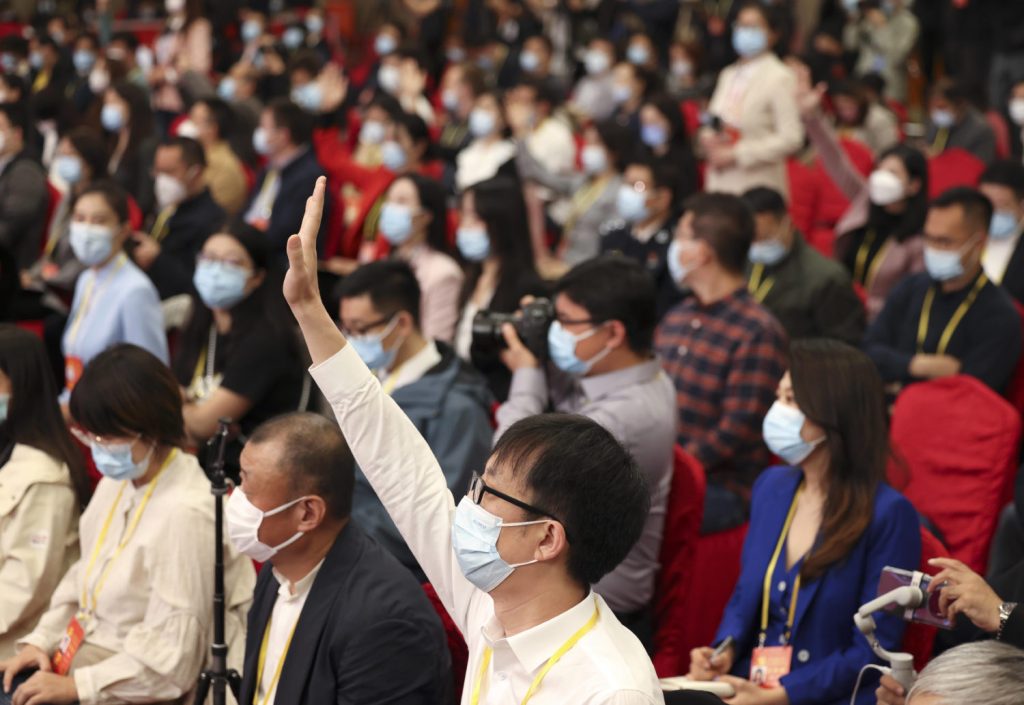
All of China’s media, as well as foreign media representatives, are present at the press conferences surrounding the current 20th National Party Congress. But who is allowed to ask a question and, above all, which one, is decided in advance down to the last minute detail. Even if this picture suggests that persistent hand raising allows journalists to ask a question – even that is orchestrated.
At the Berlin Foreign Policy Forum this week, the importance of greater independence for Germany from the People’s Republic of China was once again a matter of intense debate. By contrast, Hong Kong’s head of government declared the opposite to be the ideal solution: John Lee wants to incorporate his city even more deeply into Mainland China. The economy and administration should continue to converge, he emphasized in his first keynote speech in the office of Chief Executive. He wants to systematically pursue the dissolution of his city’s special position.
Only when it comes to Covid has Hong Kong now taken a largely liberal path. After two years of strict regulations, there is hardly anything left of the panic about the spread of the disease – in stark contrast to the situation on the other side of the border.
Hong Kong apparently realized that it suffers more than any other metropolis from the loss of skilled workers and urgently needs to get its act together to avoid being left behind for good. Within two years, 140,000 people have left the city forever.
Such an exodus is not as easy for people in the People’s Republic. But an alternative is crystallizing more and more – moving to the countryside. Fabian Peltsch tells us the story of several dropouts, a story that already reduces a bit of stress just by reading it.


The long shadow of Beijing’s central government loomed over John Lee’s first keynote speech. Right at the beginning, Hong Kong’s Chief Executive once again thanked China’s President and Party Leader Xi Jinping for his words of encouragement when he took office. This would have been an understandable gesture if Lee had only taken office the day before. However, it has already been more than three and a half months since the former police chief took over the city’s administration.
The fact that Lee nevertheless immediately addressed warm words to the Party chief in Beijing before turning his attention to the city’s urgent problems may be interpreted as a ritualized fulfillment of duty as part of Hong Kong’s new political conformity. Despite months of fierce protests by millions of people, the city ultimately lost the autonomy it was promised until 2047, not to mention its democratic development, as it was contractually promised 25 years ago.
That Lee formulated the cornerstones of his policy in parallel with the Party Congress in Beijing, symbolizes Hong Kong’s forced close ideological ties to the People’s Republic. And as if Lee had already fully assimilated into the CP cadres, he delivered the longest keynote speech by a Hong Kong head of government since the city’s handover to China. He demanded the attention of his audience for a full two hours and 45 minutes.
His speech was about as long as the list of challenges that Hong Kong faces. Above all, there is political stability. Lee expressed hope for a “capable government that can deliver results” to lead Hong Kong into the future. Pivotal to that approach: A strong sense of “national sovereignty and security” among administrative officials at all levels. Employees who are “meritorious and exemplary” should be appropriately rewarded in the future.
The growing importance of national security, as also formulated in Hong Kong’s Security Law in 2020, has put active political opposition behind bars or chased it out of the country in recent years and deprived free media of their working basis. Security, as Lee defines it, is thus most likely guaranteed if the city’s people can at least develop existential prospects after they lost their traditional rule of law based on the British model, their liberal civil rights such as freedom of speech, freedom of assembly or freedom of the press.
This is why the city must satisfy such needs first and foremost. “The objective is to let people see hope of getting on the housing ladder earlier and having decent homes,” Lee said. Under a new Light Public Housing (LPH) policy, he wants 30,000 new units built, cheaper to buy than before and at least 26 square meters in size. All of this is to be done quickly, cutting people’s wait time for a suitable unit by two years to just four and a half years on average.
With the development of new residential space in the so-called Northern Metropolis in the New Territories, including the planned technology park on the border with the People’s Republic, Lee wants to further intensify cooperation with Chinese companies. Hong Kong and neighboring Shenzhen are to be progressively integrated. The geographical merger of the cities is part of China’s expansion plans for the entire region, including Guangzhou, Zhuhai or Macao.
In the midst of all this, the Covid pandemic seems like nothing more than a minor nuisance. The city’s harsh Covid regulations also did their part to scare off many foreign companies in the past two years. Now, immigrants do not require a PCR test, nor do they have to go into quarantine. Lee did not want to dedicate more time to the matter than absolutely necessary. “The government will continue to move forward with adjustment and enhancement to anti-epidemic measures in light of the actual situation and development,” he said.
Unlike the People’s Republic, Hong Kong opened its borders to the outside world almost unconditionally almost a month ago. New arrivals are only barred from visiting certain facilities for three days. Otherwise, they are allowed to move freely around the city – partly because hardly any other financial metropolis suffered as much from the departure of international workers during the pandemic as Hong Kong. 140,000 people left the city in the past two years. Among them, however, are tens of thousands of Hong Kong citizens who fled the growing authoritarian development in the city, rather than Covid.
As a result, the local industry faces a growing shortage of skilled workers and experts. Lee promised the city would go international in its search to “snatch up talent” from around the globe. Beijing understood that Hong Kong needs relaxation more than any Chinese city – in part because of the “brain drain”.
The approach here: Lee wants to make Hong Kong more attractive, already starting with university graduates, by issuing visas for two years and reducing the bureaucracy involved in their renewal. Foreign property owners are to be granted tax refunds in an effort to convince them to keep their property and potentially remain in the city. And hiring foreign workers is to become generally easier for local companies.

Under fire from Russia, threatened by China – Europe’s promise of security and freedom is at stake, warned Foreign Minister Baerbock at the Berlin Foreign Policy Forum on Tuesday. Her order of the day was resilience against authoritarian regimes. This also applies to Germany, which must not repeat the mistakes of its Russia policy with China, Baerbock said. “One-sided economic dependence exposes us to political blackmail.”
Baerbock wants a change in Germany’s China policy. But in the end, it is Chancellor Olaf Scholz who will sit at the table with Xi Jinping. And he will do so in just two weeks. The Chancellor will be the first G7 head of government to make his way to Beijing since the beginning of the Covid pandemic. He is not alone: As with the numerous trips of his predecessor Angela Merkel, Scholz will be accompanied by a large business delegation, of which at least some members may be hoping for the big deal in China.
Would this mean sticking to the cozy course of the Merkel era, which prioritized the prospect of economic benefits above all else? Scholz would take a big risk. Because Angela Merkel’s Panda China no longer exists, says Kevin Rudd, former Australian prime minister and sinologist, who was also present. Xi Jinping would emerge stronger from this week’s CP Congress in Beijing, believes Rudd. Xi’s “Marxist-nationalist course” will make China’s foreign policy more aggressive – partly because the economy is no longer the top priority. In these uncertain waters, Scholz seeks continuity, Baerbock does not. This is another reason why Germany still does not have a China strategy at the ready, even months after its announcement.
But what do foreign countries expect of Germany? The Baltic States welcome the German foreign minister’s call for more independence from China, partly because Beijing already punished Lithuania with trade embargoes for its stance on Taiwan months ago. Latvia, Estonia and Lithuania left the former 17+1 format of eastern and southeastern European states – frustrated with Beijing’s paternalistic behavior and broken investment promises.
If Baerbock’s announcement of greater independence is not followed by action, German foreign policy will face a further loss of trust in Europe after the ongoing debates about arms deliveries to Ukraine.

Trust is also a concern for the United States, especially with regard to the Indo-Pacific. China’s military marches up on Taiwan’s doorstep. For years, the US has been increasing its presence, and Germany, too, starts to crawl out of the woodwork. Following the deployment of the frigate Bayern last year, the German navy plans to send warships to the region every two years. But Washington would like to see more.
Is Germany unable or unwilling to do more? State Secretary Franziska Brantner hopes that Germany’s support for Ukraine will also send a signal to the Indo-Pacific: “You can’t just attack another country and get away with it,” Brantner said at the Forum. So will Germany increase its presence in the region? Probably not. “In the area of security, we are still very dependent on the US,” Brantner says.
That is why the German government’s China strategy is eagerly anticipated. Baerbock’s ministry has to perform a balancing act. It must live up to the expectations of the partner countries and cater to domestic sentiment at the same time.
The Berlin Pulse shows: More than 60 percent of Germans are willing to accept cutbacks so that Germany can reduce its economic dependence on China. Only just under 20 percent of Germans want closer relations with China. The general perception of China among Germans has also deteriorated rapidly. Nevertheless, many Germans favor a restrained foreign policy: Only just under half of the German population can imagine increased involvement in fighting international crises.
In the event of a Chinese invasion of Taiwan, Germany’s economy would suffer due to its close ties with the Chinese market. The result would be a political balancing act, just like after Putin’s invasion of Ukraine. It remains to be seen whether Chancellor Scholz will actually take his proclaimed “turning point” with him to Beijing. His colleagues from Eastern Europe will remind him of this often enough. Jonathan Kaspar Lehrer

“This is heaven on earth,” says Zhang Jinglei about her new home. The filmmaker spent ten years in China’s capital Beijing. Ten months ago, she packed her bags and moved to Caicun, a suburb of the city of Dali in the province of Yunnan, about 2,000 kilometers away. In just a few days, the 32-year-old found a two-room apartment for 1,000 yuan in the Bai-minority village. In Beijing, she paid well over three times that amount – for a room in a shared apartment.
The wish to leave Beijing had matured in her for quite some time. Escaping the social pressure in the city was only possible with amusements and alcohol. “I had to take the plunge,” she says. Her life is easier now, says Zhang, who was born in Tianjin, a city of 14 million people. She adopted a dog and even a pig, which she now walks on a leash.

Although the Chinese government promoted urbanization for decades, a reverse migration trend also began to develop. Real estate prices in urban areas have become very expensive, especially for young people entering the job market, and fierce competition for school spots in popular neighborhoods has become nerve-wracking. Added to this is a new awareness of physical and mental health among the middle class. During the Covid pandemic, many Chinese also discovered the diversity of their homeland. According to the Chinese travel portal Trip.com, never before have so many road trips been booked in China as in the past two years. Outdoor sports and camping have also never been more popular in the People’s Republic.
Other city dwellers who turned their backs on the urban insanity during the pandemic live in her house in Caicun, Zhang tells us, including, for example, a former Huawei employee. Many young people who moved to the countryside would at first “lie flat” (躺平 – “tangping”) a buzzword used to describe the social protest of young Chinese who, instead of pursuing of career, family and possessions, only do the bare minimum to make ends meet (China.Table reported). But after a period of acclimatization, many of them want to do something. “Baking bread, opening a bar, or selling art on the street.”
The government welcomes the new urban exodus. President Xi Jinping first spoke of his “rural revitalization” strategy in 2017. This involves the continued replacement of small farmers with large agribusinesses, but there are also newer initiatives to promote medium-sized, organic farms. Another goal is to expand infrastructure with schools, clinics, housing, roads and rail networks. The aim is to make life in the countryside so attractive that urbanites will also move their lives there.
“There are many attempts to revitalize rural areas with young talent,” says Elena Meyer-Clement, professor of Chinese studies at the University of Copenhagen. One of her main research areas is urbanization, and administrative and land reforms in China’s rural and semi-urban regions. Individual local governments specifically promote entrepreneurship and tourism, she says. “It’s a trend that can be seen in almost all other post-industrial states, whether it’s Japan or Brandenburg in Germany.”
What is special, however, is that this process takes place in China at the same time as rapid urbanization – “almost like a kind of exchange of the population controlled from above,” she says. To put it bluntly, small farmers are to migrate to the cities to boost domestic consumption, while young, educated townsfolk are to bring fresh, creative ideas to the countryside to help make the local economy more socially and ecologically sustainable.
That includes so-called “beautiful villages,” Meyer-Clement says. “This involves renovating existing villages or creating completely new ones that look like spruced-up traditional villages.” One example is the village of Longtan with its little creek and mill wheel, which nestles picturesquely in the mountainous landscape of the province of Guangxi. According to the local government, it is supposed to be 400 years old, and it encourages the influx with a budget for art projects and renovation work.
The feng shui seems to be right: Every year, 200,000 tourists visit Longtan to admire the Qing architecture or to watch plein air painters at work. Even the older villagers here have been trained as artists who now sell their work to tourists. “Many of these creative rural residents have Douyin channels, the Chinese TikTok, where they demonstrate how simple but modern rural life can be,” Meyer-Clement says. “Young, dynamic, creative mixed with time-honored values that have been lost in the city.”
However, the trend was only sporadic and limited to more developed areas, especially on China’s east coast. “Absolute poverty has just been overcome. Artist villages are not yet a big deal there,” Meyer-Clement says. “Things like e-commerce already work very well in the countryside. However, I would doubt whether these beautiful villages are a sustainable strategy.”
The new country dwellers, however, certainly see it differently. Shen Lan is one of them. Shortly before Shanghai went into its first major lockdown, the author and cultural scientist moved with her husband to an artists’ village outside Liangzhu in the province of Zhejiang. The landscape, shaped by mountains and rivers, is closely interwoven with Chinese cultural history. People already settled here several thousand years ago.
In the picturesque scenery, Shen is working on a book about Chinese natural philosophy, hermitage, and art. In the morning, she often likes to walk up a hill, ten minutes from her house, to watch the sunrise. Other dropouts like her, a writer, a professional dancer and a professor of anthropology, live in her village. The atmosphere is very warm, she says.

For seven years, Shen had lived in Shanghai, in a spacious apartment near the Jing’an Temple, with a small garden in the backyard. Still, she never found what she was looking for in the city: balance and spirituality. Just like the philosopher Zhuangzi, Shen believes life in the countryside is closely interwoven with the philosophy of tiān rén hé yi (天人合一): The human being is a part of nature. Heaven and man were originally one. The goal is harmony of all elements. “We Chinese have a very deep connection to nature, it’s in our blood,” Shen says. Even the ancient Confucians dreamed of retiring to the countryside once they had fulfilled their duty in the world.
Her long-term goal is to live in an even more eco-friendly and sustainable way, and perhaps one day start an eco-settlement herself. “It’s like going back to our roots. With a higher awareness of nature, of life and of who we really are.” Collaboration: Renxiu Zhao
According to reports, the Australian military is investigating allegations that former pilots have accepted training assignments in China. “I would be deeply shocked and disturbed to hear that there were personnel who were being lured by a paycheck from a foreign state above serving their own country,” Australian Defense Minister Richard Marles said.
Marles’ statement was in response to a BBC report published the day before. The report claimed that up to 30 former British Royal Air Force pilots had been recruited by China’s military as instructors (China.Table reported). The former pilots were offered up to the equivalent of €275,000 to share their knowledge with the Chinese air force.
A spokesperson for the New Zealand Defence Force told Reuters that there have been four known cases of former military members taking up new employment through a South African flight school. Former employees are free to accept new employment after leaving the service. However, this could have implications for continued employment with the armed forces. The South African company in question has not yet responded to inquiries about whether it has hired pilots from the United Kingdom, Australia and New Zealand and sent them to China. mw/rtr
Taiwanese chip contract manufacturer TSMC considers expanding its production capacity in Japan. One goal is to reduce geopolitical risk, reported the Wall Street Journal with reference to internal sources. However, TSMC sources said that no decision has been made yet. The Taiwanese company, which manufactures chips for a variety of large electronics products, is currently building its first chip plant in Japan, located on the southern island of Kyushu.
The semiconductor industry entered a period of upheaval last year, when widespread shortages of chips crippled the auto industry and other sectors. At the same time, the United States and allies like Japan are concerned about the rise of China’s semiconductor industry.
TSMC’s factory currently under construction in Japan is part of the response to these problems. The plant is expected to produce less advanced chips, commonly used in cars and components such as sensors in late 2024. In July, TSMC President Mark Liu stated at the company’s annual general meeting that there were no “concrete plans” to build a plant in Europe (China.Table reported). mw
German anthropologist Adrian Zenz received the first-ever “Snow Lion” human rights award from the International Campaign for Tibet (ICT). Zenz received the award, which comes with 3,000 euros in prize money, at a ceremony last Saturday at the Umweltforum Berlin. The 47-year-old was honored for his groundbreaking research into the internment of millions of Uyghurs and members of other ethnic minorities in the northwestern Chinese autonomous region of Xinjiang.
In 2018, Zenz first made details of his work public that proved systematic re-education with blatant human rights violations by the Chinese government in Xinjiang. Most recently, Zenz published the so-called Xinjiang Police Files, which consist of large records of local police data. The images provided the first insights into the daily life of prisoners in the camps and helped identify several thousand detainees by name.
In his laudatory speech, conservative Michael Brand (CDU), a member of the Bundestag, praised Zenz’s determination, “even though he knows very well that he is opposing the largest dictatorship on our planet, which has gained a great deal of influence and control globally with violence on the inside and a lot of money and many threats on the outside.” grz

In 2018, Katja Drinhausen decided to leave China for good. At the time, she already lived in the country for twelve years, but then everything fell apart. “The room for debate has narrowed more and more since Xi Jinping took office,” says the current Program Manager at the Merics research institute. By contrast, in the late 2000s, discussions on the Chinese Internet virtually exploded.
Among the best-known bloggers at the time were artists, academics and activists. But it was not only their spectrum that the government constantly restricted. The exchange and cooperation with China’s academia or civil society on social, political or legal issues also grew ever narrower. This development was reason enough for Drinhausen to return to Germany.
In a way, Katja Drinhausen was born into a life with or in China. Her mother was a sinologist at the University of Leipzig, and she spent parts of her early childhood in Taiwan. In this respect, it is not surprising that Drinhausen earned a reputation as a renowned China expert in Germany. She is often consulted when it comes to the Chinese legal system, the human rights situation or the communication strategies of the Communist Party.
But her path was by no means as straightforward as the cornerstones of her biography would suggest. “I actually wanted to do something completely different from what my mother did,” she says now. Although she also initially studied sinology, “I always found it much more exciting to look at current social and political developments in China.” A need she met in the early 2000s with regular trips to the country. One year before the Olympic Games, she finally made her way to Beijing.
She dropped out of her sinology studies and jumped into the event and gastronomy scene in the capital, far away from academic society. To keep her finger on the pulse of China’s political world, however, this line of work proved less ideal. So Drinhausen quickly moved on, taking a job at the Hanns Seidel Foundation, where she initially devoted herself to media and political monitoring. “The interest in the topics that accompany me to this day stems primarily from that time,” she says. At the time, many influential bloggers were lawyers and advocates, some of whom were very outspoken in their criticism of the government. That was one reason to study international and Chinese law in Beijing – with a focus on human rights.
Today, like many of her colleagues, she stands on the other side of the Great Firewall, which China has long used to not only control the Internet, but also its society. This has changed Katja Drinhausen’s work. Not only for the worse, as she finds. She now works a lot with Open Source Intelligence, searching publicly available sources and databases to draw an overall picture.
She notes that, although the red lines have increased in number and moved closer to people’s everyday lives, some topics continue to be controversial and quite openly discussed, such as the harsh lockdowns of recent months or violence against women in Chinese society. “You can see how hard it is for even a full-blown surveillance state to keep all debates in check,” she says.
With the project China Spektrum, she strives to reflect precisely this diversity of debate for the European public as well. It also seeks to draw attention to the situation of ordinary citizens in the People’s Republic. After all, China is more than just a state. Nils Wischmeyer
Anton Vong has been Project Lead for Change and Cooperation Management Joint Ventures BMW China at BMW in Munich since August.
Tian Huiyu, a former bank director, was expelled from the Chinese Communist Party. In April, he was arrested for corruption as head of China Merchants Bank.
Is something changing in your organization? Why not let us know at heads@table.media!

All of China’s media, as well as foreign media representatives, are present at the press conferences surrounding the current 20th National Party Congress. But who is allowed to ask a question and, above all, which one, is decided in advance down to the last minute detail. Even if this picture suggests that persistent hand raising allows journalists to ask a question – even that is orchestrated.
